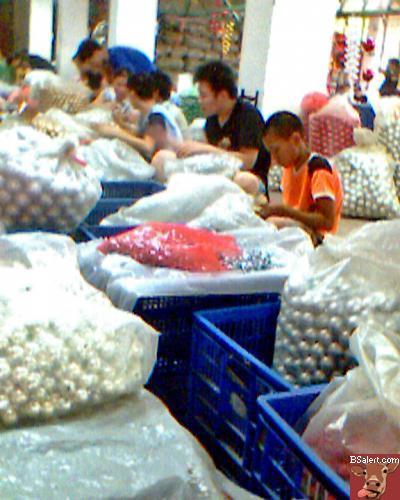|
|
Inside: A Wal-Mart Sweat Shop Christmas
Posted by Pile
(24415 views) |
  |
 At Wal-Mart, Christmas ornaments are cheap, and so are the lives of the young workers in China who make them, apparently. At Wal-Mart, Christmas ornaments are cheap, and so are the lives of the young workers in China who make them, apparently. | |
The Guangzhou Huanya Gift company describes itself as being “among the top three Christmas ornament producers in mainland China,” with “long term, friendly, collaborative relationships with industry leaders Wal-Mart…” There are 8,000 workers in the factory. At the Guangzhou Ornaments factory, every single labor law in China, along with internationally recognized worker rights standards, are being systematically violated on a daily basis. Grueling Hours: Ten to 12 to 15-hour shifts, seven days a week are the norm during the long, eight-month busy season. Workers can go for months without a single day off. At a minimum, workers are at the factory an average of 84 ¼ hours a week, while toiling 77 hours. However, at least half the workers, some 4,000 people, are routinely at the factory 105 ¼ hours a week and working 95 hours, including 55 hours of overtime, which exceeds China’s legal limit by 562 percent. Any working daring to take a Sunday off will be docked 2 ½ days’ wages as punishment. Workers were pressured to sign a “voluntary” Overtime Application Form in which they “agree” to work more than three hours overtime a day, to work on Saturdays, Sundays and holidays, and with no guaranteed minimum wage or overtime premium. Cheated of their wages: The legal minimum wage in Guangzhou, China is 55 cents an hour, but factory management respects neither the minimum wage nor the mandatory overtime premium. Workers are paid by a piece rate, with some workers earning just 26 cents an hour, which is half the legal wage. Wage documents smuggled out of the factory for a ten-day period (June 21-30, 2007, which included two Saturdays and one Sunday) show the workers earning a median wage of 49 cents an hour, while by law they should have been earning at least 68 cents an hour. For working a minimum of 110 hours in the ten day period, the workers were paid just $49.29 instead of the $74.77 they were legally owed. On average, the workers were cheated of $25.48—one third of the wages legally due them. Only eight percent of the workers in the sample earned at or above the legal minimum wage, with 92 percent falling below that. Management also illegally withholds one month’s wages from each worker, making it almost impossible for workers to leave the factory without forfeiting that month’s wages. High School Students Blow the Whistle on Wal-Mart: In the summer of 2007, the Guangzhou Huanya Ornaments factory hired 500 to 600 sixteen-year-old high school students, who were promised they would never be required to work more than 10 hours a day, six days a week, while earning more than 1,000 RMB ($132.63) a month. Once in the factory, the teenagers found themselves forced to work 12 to 14 hours a day, seven days a week, for wages nowhere near what they were promised. After a few weeks, many students were so exhausted they could barely walk. The students had had enough and went on strike on July 8, also filing a legal suit against the company. Student representatives went to the local labor bureau not only to denounce the grueling hours, seven days a week, for payment below the legal minimum wage, but also to inform the labor officials that several children, some as young as 12 years of age, worked in the plant. The high school teenagers were able to quickly recognize and document gross human and worker rights violations, including child labor, at the plant, while Wal-Mart—the largest retailer in the world—was apparently unable to discover any such abuses over the course of years. The 12 and 13-year-old workers hired during the summer were required to work the same 10, 12 and 15-hour shifts, seven days a week, as the older workers, including the all-night shifts from 5:45 p.m. until 6:30 a.m. or later the following morning. Workers Handling Potentially Dangerous Chemicals: Workers in the Spray Paint department lack even the most rudimentary protective gear—going without gloves or the cheapest disposable respiratory masks—while handling potentially dangerous paints, “gold” dust, thinners and solvents. Workers who develop serious skin rashes or sores have no choice but to leave the factory, as management will not pay medical bills or for days missed. The Real Ornament is China’s Labor Laws: The Christmas ornament workers are in a trap. Few workers know the labor law, and even if they do they have no idea what avenues to pursue to seek their rights. Nor are there independent unions to help them. Local labor bureaus are passive at best, and sometimes corrupt. Either way, there is little aggressive monitoring of factories known to be engaging in illegal behavior. | |
PDF Version of National Labor Committee report | |
| Posted by Anonymous on 2009-01-26 12:30:39 |
| nerf |
| 1 Article displayed. |


 Bumper Sticker Store
Bumper Sticker Store



